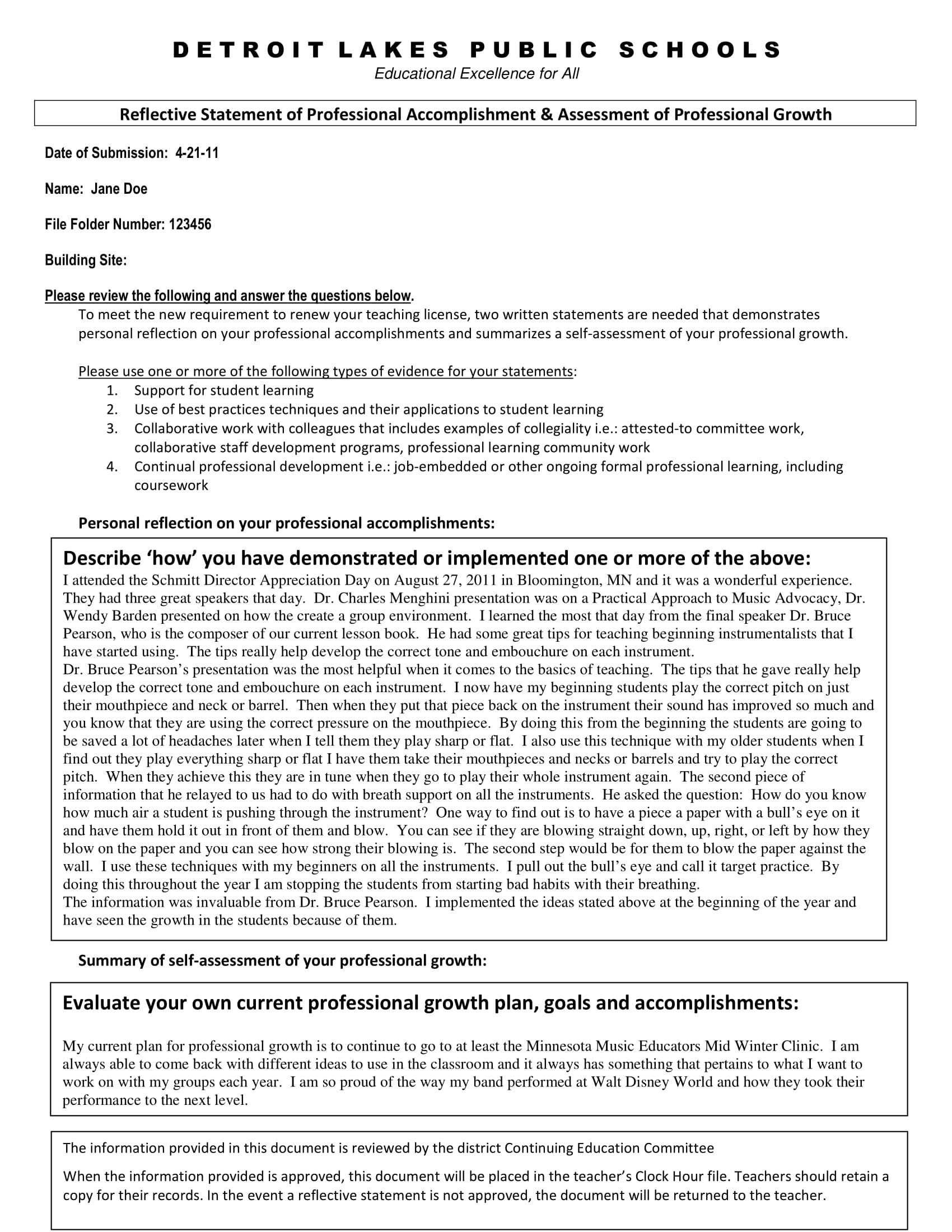Reflective Statement Examples
Those experiences also serve a different purpose aside from just being mere memories and reminders. Some people use those as fuel to push forward and live a better life. No matter the impact though, it is always good to look back.
Looking back on the past doesn’t necessarily mean you haven’t moved forward, you simply just want to reflect and find meaning again as to why you continue to live. You find your purpose when you look back on the things and experiences that made you who you are today.

What is a Reflective Statement?
Whether in an academic, business or work environment, reflecting from your past is a good exercise to measure your growth. Writing refection papers about certain topics is a common exercise especially in the academe. It is a task where students are encouraged to make their own synthesis based on their own understanding about a topic.
A reflective statement, in the academe setting refers to the method in writing that is basically about hindsight that assists students in figuring out how education has helped them grow. It also assess the advantages and disadvantages they have gained from a certain choice they have made.
Reflective statements are also commonly used outside the academic setting. It helps an individual look back on prior decisions and helps him thoroughly think about the outcome if he/she has made a different choice. It can also be used in business to help assess if the business decision made in the past helped the individual grow as an employee/officer.
With your reflective statements, you must be able to determine the importance of your development and consider how it will enable you to improve in your profession.
Types of Reflective Statements
Description
This is the most basic type of reflective statement. The writer will be tasked to recall the details regarding a certain event/activity and include factors such as what he felt before/during/after the said event, and his preparation prior to the event. This exercise will help the writer determine what he could have done differently in order to predict the result of those choices and compare the reality from the what ifs.
This exercise will help the writer become more adept in making wiser decisions if the situation arises again. Through this exercise, the writer can exhibit his/her maturity in handling such same situations.
Analysis
This type of reflective statement requires the writer to dig deeper compared to the description type. It demands and needs more thought and effort in doing so. Just like the description reflective statement, the writer is tasked to recall a past event, however, analysis requires an assessment of how the past event helped shaped the present and the benefits it has given to the writer.
Aside from that, an analysis can also be made through the interpretation of the most significant factors that has led to a certain experience. For example, a new employee may write a reflective statement on the difficulty on the task he is working on and about having a hard time adjusting to his colleagues. He may use this approach to determine the attitudes, mannerisms and mindsets to properly perform tasks as well as establishing stronger relationships with colleagues.Download
Synthesis/Judgment
This type of reflective statement revolves around the reflection on what a certain experience taught an individual and what that certain event meant to him/her. This means analyzing the certain event itself, its outcomes, and the various effects it has brought to the individual. Aside from focusing on the literal and/or physical implication of the decision made on that event, the writer has to explain how that choice affected other aspects of his life as well. It is also an assessment on the improvements brought by that certain event or decision.
For example, an employee can write a synthesis or judgment on his decision to become a fashion designer. However, aside from explaining the economical improvements the decision brought, he also has to explain how that decision made him gain more friends and helped established relationships with other people in the workplace.

Goal Setting
This type of reflective statement is somehow connected to the judgment approach, as the writer explains the improvements he has noticed within himself and makes goals afterwards. However, the writer must only set relevant and attainable goals in order to reflect on his growth. Setting up goals that are nearly impossible to achieve (for example, fantasies) is simply setting the writer up for failure. In this approach, it is also recommended to include long-term goals as well as short-term ones to have a well-rounded reflective statement.
What Makes a Good Reflective Statement?
While it may be easy creating a reflective statement about previous ventures, the actual reflective statement may lack depth or may be too stuffy for readers. Translating your thoughts into words can be a very difficult task to do. Here’s a short checklist to see if your reflective statement can capture the interest of your readers:
- It is written as a comprehensive and brief narrative that is easy to understand by different audiences.
- It includes at least one of the four approaches as mentioned above.
- It aptly addresses an experience that is relevant for the topic being discussed.
- It is greatly influenced by factual knowledge as well as personal opinions.
- It should not include bias and/or does not skew pertinent data.
- It incorporates new and visionary insights on the discussed topic.
- It exposes the individual’s decision making process.
Reflective Statement Example
Tips to Writing Better Reflective Statements
Here are some tips to help you write better and much more effective reflective statements:
The competencies wheel is tool used to help you determine which aspects in your profession you would want to develop. Since your reflective statement needs to cover learning exercises and personal development, the competencies needed for your profession should offer you insights on the flexibility needed to fit the context of your job and organization. The wheel is a logical place to begin your reflective statement writing since it would make you familiar with the competencies that suits you best.
2. Set aside a specific time to reflect
Doing anything without allotting a decent amount of time for it will not be favorable on your end. In order to come up with an effective reflective statement, you must give yourself the time to reflect on things that has happened. Before you write your reflective statement, you must set aside ample amount of time to reflect and analyze your progression and development from the past to fully understand your strengths and weaknesses.
3. Think about your everyday work tasks
Most of the time, you disregard how everyday tasks or chores impact your career. Don’t just assume that significant reflections only come from formal learning or training experiences. Your personal experiences is as important as your formal learning. Relevant experiences can essentially apply to all your activities in work. As you perform daily tasks, whether they turn into successes or failures, you realize the lessons you learned can also be applied in professional tasks.
4. Reflect on your working week
Reflecting on the work week is an excuse to become an over-thinker. Casually thinking about the work week that has passed and gathering insights will help you through those experiences to come up with better decisions in the future. Take time to reflect on areas where you have grown. You can do this regularly to assess your growth and personal development.
5. Take notes
Keep tabs of your thoughts in order to utilize them later. You can save your mental notes by listing them down in journals, post-its, or voice memos. When you have run out of ideas, it is always a good idea to share your thoughts to your colleagues, peers, managers or maybe even your clients.

In conclusion, your reflective statement is a personal reflection of your growth and development. Having a reflective statement will help you create a better version of yourself so that you don’t only contribute to your workplace, but to the community as well.



